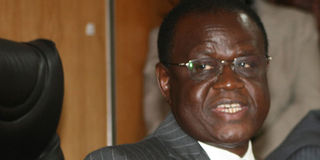PNU: Move to dissolve PSC 'unconstitutional'

The Party of National Unity through secretary general Kiraitu Murungi has termed the proposed motion to dissolve the Parliamentary Service Commission as “unconstitutional” October 7, 2011. FILE
The Party of National Unity (PNU) has termed the proposed motion to dissolve the Parliamentary Service Commission as “unconstitutional”.
It added that it had “full confidence” in the team as currently constituted.
“The revocation of the members of the parliamentary service commission is to us, unconstitutional,” said the dispatch signed by Kiraitu Murungi, the PNU secretary general. There was no explanation as to the unconstitutionality of the proposed motion awaiting the Speaker’s approval.
In the brief dispatch to Parliament’s Media Centre, the PNU said the motion will in effect be a vote of no-confidence in the current membership of the commission. Such a motion will have considerable implications given that the Vice President Kalonzo Musyoka –as the Leader of Government Business in the House-- and House Speaker Kenneth Marende sit in the team.
A commissioner allied to the PNU wing of the coalition, who sought anonymity because of the seriousness of the allegations made against the PSC, said that if the motion gets the Speaker’s nod and is approved by the House, it will mean that even House Speaker Kenneth Marende and the VP will have to vacate their positions.
The proposed motion by Mr John Mbadi (Gwassi, ODM) cites incompetence and nepotism as the basis for the call to send the current members packing and have a fresh team to look after the welfare of MPs and staff of Parliament. The ODM whip Jakoyo Midiwo has backed the motion saying the PSC was “dysfunctional”.
But as PNU waxed legalese, it has emerged that the push to dissolve the Parliamentary Service Commission is a confluence of a political jostling by the current political formations—ODM and PNU-- with each keen to take control of Parliament before the next elections.
In separate interviews with a commissioner and several employees of the National Assembly, regarding the proposed motion, the Nation learnt that aside from the internal wrangling among commissioners over procurement and hiring of staff, there was a well-crafted plan to prop-up relatively new employees for them to take over two key positions set to fall vacant next year.
The Clerk of the National Assembly Patrick Gichohi is set to retire next year. And so is the Senior Deputy Clerk Owino Omollo. To prepare for their exit, the current commissioners have lined up for promotions their loyalists.
The idea is that by the time the top two in Parliament’s bureaucracy leave, these handpicked individuals from either party will be in a position to be picked as replacements, and with that, whichever party wins in the tussle, it will have considerable clout in the Senate and in the National Assembly.
According to the Constitution, the PSC will pick the Clerks of both the Senate and the National Assembly, but the nominees will have to get the approval of the relevant House.
In the current commission, PNU has the Vice President, Mr Joseph Lekuton (Laisamis), Peter Mwathi (Limuru), Jamleck Kamau (Kigumo) and Adan Keynan (who was picked in acting capacity to replace Mr Walter Nyambati who was kicked out after he lost an election petition).
ODM on its part has former powerful permanent secretary Zakayo Cheruiyot (Kuresoi), former Finance Minister Chris Okemo (Nambale), Olago Aluoch (Kisumu Town West) and has one vacant slot to fill following the appointment of Julius Murgor (Kapenguria) as an assistant minister.
The PSC is chaired by the Speaker, with the Clerk of the National Assembly as its secretary. It is the one that comes up with the budget of the National Assembly and it is also the one that supervises how that money is spent. This year’s budget to the National Assembly is Sh10.5 billion.
The key thing that the PSC has so far done for the MPs in the Tenth Parliament is the decision to push the House Speaker Kenneth Marende to speak to the President and the Prime Minister and get Sh2 billion to cover the lawmakers’ taxes. The move succeeded.
The commission is also overseeing the modernization of Parliament, but this is enormously behind schedule. This team is the equivalent of the Public Service Commission, because it handles the payroll for all parliamentary staff.
The PSC is one of the pillars upon which the autonomy and independence of Parliament is hinged.




